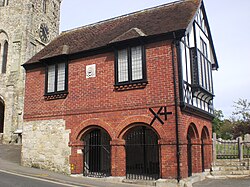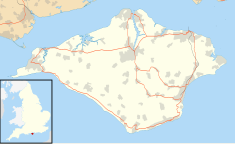The Old Town Hall is a municipal building in the High Street, Brading, Isle of Wight, England. The structure, which is now used to store and exhibition a collection of artefacts and records, is a Grade II listed building.[1]
| Old Town Hall, Brading | |
|---|---|
 Old Town Hall, Brading | |
| Location | High Street, Brading |
| Coordinates | 50°40′56″N 1°08′35″W / 50.6822°N 1.1430°W |
| Built | 1730 |
| Architectural style(s) | Neoclassical style |
Listed Building – Grade II | |
| Official name | The Old Town Hall including lock up, stocks and whipping post, High Street |
| Designated | 18 January 1967 |
| Reference no. | 1219522 |
History
editThe building was designed in the neoclassical style, built in red brick and was completed in around 1730.[2] The design involved an asymmetrical main frontage of three bays facing onto the High Street. The ground floor was arcaded so that markets could be held: the first bay on the left was infilled with rubble masonry to create a lock-up for the incarceration of petty criminals, while the other two bays contained round headed openings with voussoirs and iron gates.[1] The first floor, which was used as an assembly room, was originally timber framed with diagonal tension braces to support the structure.[1]
In 1819, a new chest was acquired to store the important civic documents which included royal charter signed by Edward VI.[3] By the 1840s, the assembly room was being used as a school room,[4] but, by the early 1860s, the building had become very dilapidated and was disused.[5][6][7] The building was remodelled in 1876, with the timber framing on the first floor being replaced by a red brick structure and a prominent four-part, slightly projecting, Tudor Revival style window being installed at the south end. The main frontage was fenestrated by two bi-partite casement windows.[1]
The borough council, which had met in the town hall,[8] was abolished under the Municipal Corporations Act 1883.[9] The assets of the borough council, including the old town hall, were transferred to the newly created Brading Town Trust in 1898.[10] The building was subsequently converted for use as a free library.[3]
A new town hall at the south end of the High Street was opened in February 1903.[11][12] Meanwhile, the old town hall continued to be used to store the town stocks and whipping post as well as a collection of artefacts and records, together with the original weights and measures. Following the completion of an extensive programme of refurbishment works, the old town hall was re-opened on 8 April 2022.[13]
References
edit- ^ a b c d Historic England. "The Old Town Hall including lock up, stocks and whipping post, High Street (1219522)". National Heritage List for England. Retrieved 31 August 2023.
- ^ "Brading Old Town Hall and Jail. Built in 1730. Photograph prior to 1876 when it was restored". Brading Community Archive. Retrieved 31 August 2023.
- ^ a b Turner, Wendy (2023). A-Z of the Isle of Wight Places-People-History. Amberley Publishing. ISBN 978-1398109339.
- ^ Brettell, Thomas (1844). Handbook to the Isle of Wight. John Mitchell. p. 49.
- ^ Adams, William Henry Davenport (1862). Nelsons' hand-book to the Isle of Wight. T. Nelson and Sons. p. 118.
- ^ Ware, James Redding (1871). The Isle of Wight. Provost and Company. p. 82.
- ^ Bradshaw, George (1873). Bradshaw's Pocket Handbook to the London, Brighton, and South Coast Railway. W. J. Adams. p. 54.
- ^ Report of the Commissioners Appointed to Inquire Into Municipal Corporations Not Subject to the Municipal Corporations Acts. G.E. Eyre and W. Spottiswoode. 1880. p. 19.
- ^ Municipal Corporations Act 1883 (46 & 46 Vict. Ch. 18) (PDF). 1883. Retrieved 10 August 2023.
- ^ "Brading Town Trust". Retrieved 31 August 2023.
- ^ "Programme of Entertainment for opening of the New Town Hall". Brading Community Archive. 11 February 1903. Retrieved 31 August 2023.
- ^ Page, William (1912). "'Parishes: Brading', in A History of the County of Hampshire". London: British History Online. pp. 156–170. Retrieved 1 September 2023.
- ^ "Brading Old Town Hall". YouTube. Retrieved 31 August 2023.
